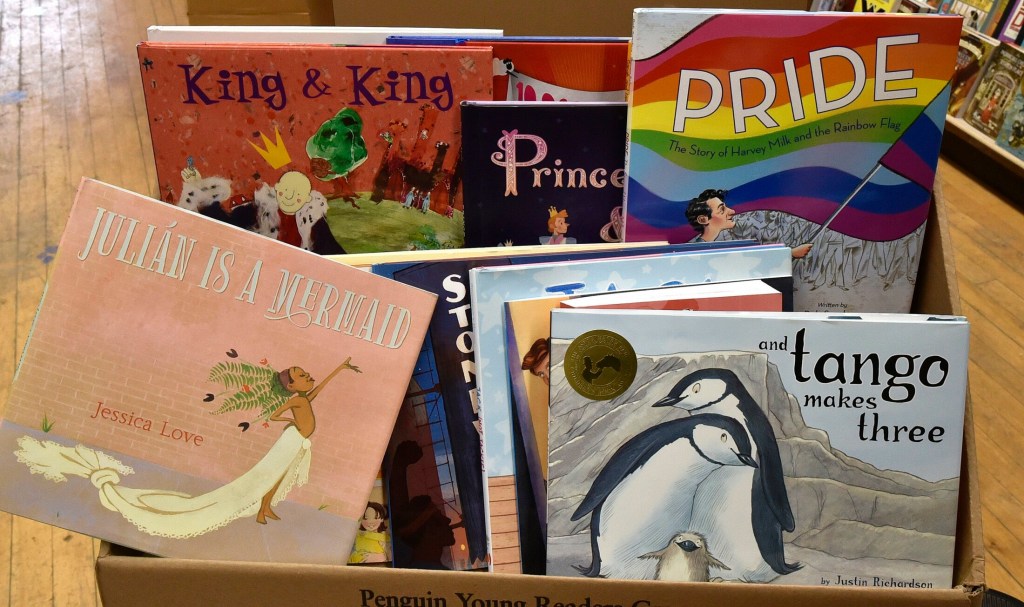Controversy over a Drag Queen Story Hour at a children’s bookstore on Main Street in Waterville shows both how much things have changed in public attitudes towards sexuality — and how much they haven’t.
The event, part of the four-day Central Maine Pride Festival, is among the many Pride observances in towns and cities around the state. Some of them date back to the 1970s, when, after the Roe v. Wade decision legalizing abortion, social issues came to fore in political discussions, where they remain to this day.
Organizers for what was originally called the Lesbian-Gay Alliance were attempting to channel the emotions behind public celebrations that traditionally surrounded national holidays such as Independence Day and Memorial Day. The passage of the years shows they have succeeded.
Pride parades are now quintessentially family affairs, with flags and banners, and music and dancing — and fire trucks, too. Proponents of legal equality for all human expressions of sexuality have succeeded, as well, in “normalizing” perceptions of what’s now called LGBTQ in a way that, unfortunately, supporters of racial equality have not — or at least, not yet.
Drag Queen Story Hour still has the ability to outrage a few, notably Waterville Mayor Nick Isgro. In one of his signature social media postings, it was difficult to judge whether he was more bothered by the event itself, or that the Waterville City Council — “INCLUDING OUR REPUBLICAN CHAIR” — had endorsed the event.
Isgro is well on his way to becoming the kind of weird, isolated figure that Michael Heath, the former longtime executive director of the Maine Christian Civic League, ended up. It’s a noteworthy reminder that, not all that long ago, it was anti-gay rhetoric that was “normal” in this state.
When the so-called “gay rights” bill barring discrimination in employment, housing and credit was first debated in the 1970s, several male legislators spoke on the floor to compare homosexuality with barnyard behavior. Now, two prominent men, a legislative House leader and the chief of staff for Gov. Janet Mills, are married, and it hardly attracts any notice.
Not that Heath didn’t try. The moment he lost all credibility was when he threatened to “out” a lesbian member of Gov. John Baldacci’s staff, who had made no secret of her orientation but had not announced it publicly.
The appropriateness of discussions for different ages and for in different contexts, of course, remain an issue. Those concerned about the Story Hour event at the Children’s Book Cellar expressed concern that younger children might be “confused” by such a presentation.
The owner, Ellen Richmond, had a compelling answer to a planned protest, which has already drawn the inevitable counterprotest, when she said, “I’m not inviting pedophiles in to pet little children. I have one man coming in dressed as a woman to read stories to children, and then we’re going to make wands and crowns.”
Similar story hours have been going on all over the country. In Louisville, Kentucky, an event at the public library was initially canceled, but then held earlier this month, with participants — parents and children — far outnumbering those who protested outside.
It makes sense. Drag queens have been around a long time and, as a cultural phenomenon, can be reasonably compared with Elvis imitators and others who’ve made careers of lip-syncing departed entertainers. Some find them strange, but it’s hard to see them as threatening or confusing.
Those who live with, and work with, young children recognize that, from an early age, there are often affinities with both “female” or “male” traits in what is truly a lifelong quest for personal identity. Seeing that some people are “different” is confusing only for those who try to draw boundaries for others, not just themselves.
In a larger sense, these debates have been going on for millennia, and it’s not likely we’ll stop hearing them any time soon. Sex in the Roman Empire has been a staple of movies and popular literature, and — pick your favorite time and place — it still sells a lot of books and Netflix subscriptions today.
Progress is an elusive concept, but it seems we have made some in understanding how human beings can embrace differences, as well as celebrating their similarities. Solidarity can be created in more ways now than when I was growing up.
So, let the show go on. Protests come and go, but in the end, our sense of what it means to be human has been expanded in a small, but significant way.
Douglas Rooks has been a Maine editor, opinion writer and author for 34 years. He is the author of “Rise, Decline and Renewal: The Democratic Party in Maine,” and welcomes comment at: drooks@tds.net
Send questions/comments to the editors.



Success. Please wait for the page to reload. If the page does not reload within 5 seconds, please refresh the page.
Enter your email and password to access comments.
Hi, to comment on stories you must . This profile is in addition to your subscription and website login.
Already have a commenting profile? .
Invalid username/password.
Please check your email to confirm and complete your registration.
Only subscribers are eligible to post comments. Please subscribe or login first for digital access. Here’s why.
Use the form below to reset your password. When you've submitted your account email, we will send an email with a reset code.